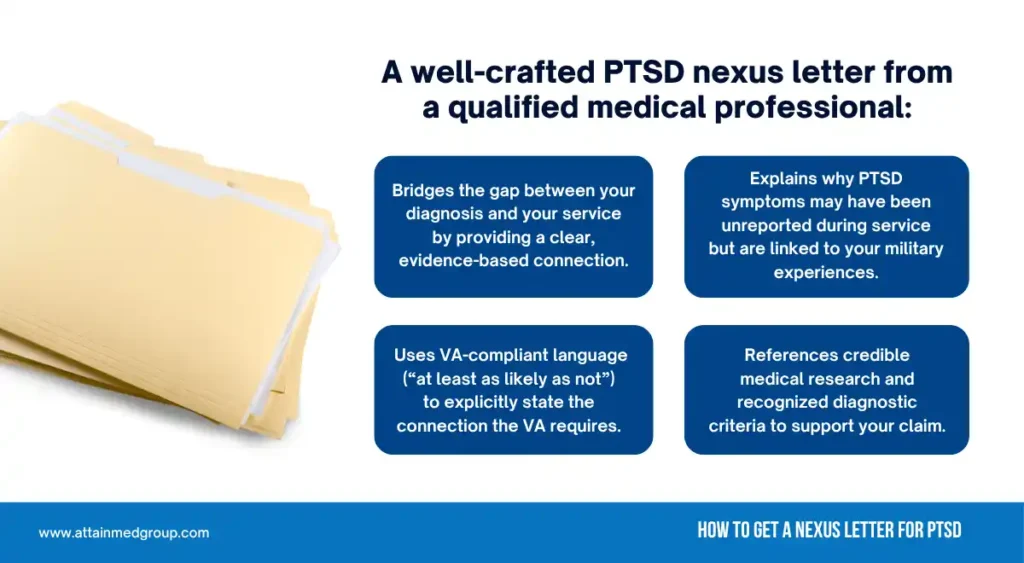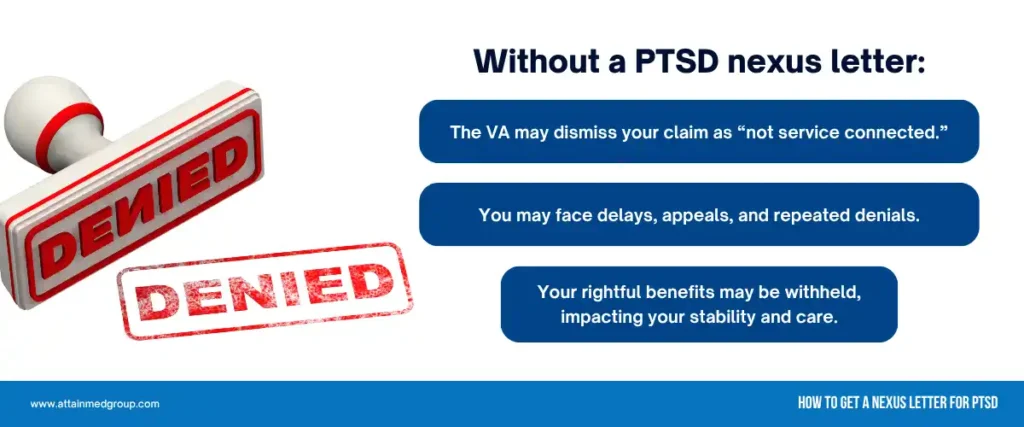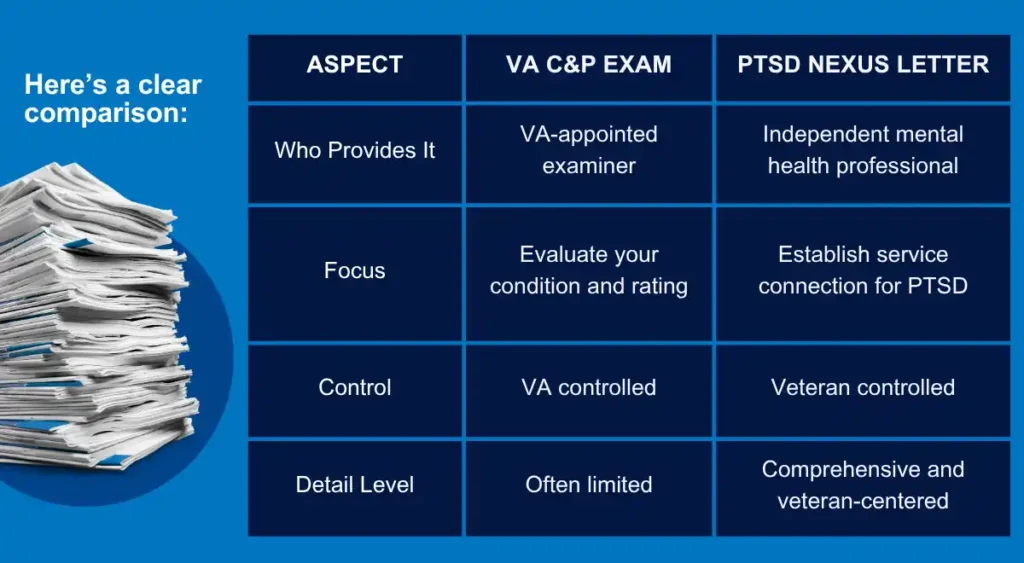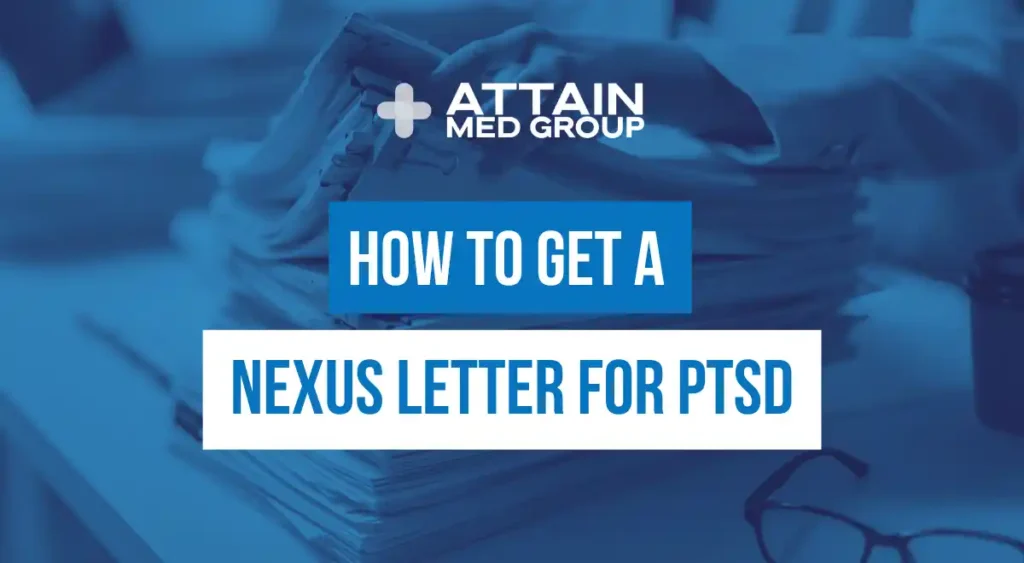Why a PTSD Nexus Letter Can Be Critical for Your VA Disability Claim? If you’re a veteran seeking VA disability benefits for post-traumatic stress disorder (PTSD), you may already know the VA requires credible medical evidence linking your PTSD to your military service to approve your claim. This is where a PTSD nexus letter becomes a powerful tool in your pursuit of the benefits you have earned.
At Attain Med Group, we help veterans simplify the VA claims process by connecting them with independent medical providers who specialize in writing detailed, accurate nexus letters for PTSD and other conditions, ensuring your case is presented clearly and professionally to the VA.
What Is a PTSD Nexus Letter? A PTSD nexus letter is a detailed, medically sound statement from a qualified mental health professional that clearly connects your PTSD diagnosis to specific in-service events, stressors, or your overall time in service.

This letter typically includes:
- A review of your medical and service records.
- Confirmation of your PTSD diagnosis.
- A clear statement using VA-accepted language, such as “it is at least as likely as not” that your PTSD is related to your service.
- Medical rationale explaining why your service contributed to or caused your PTSD.
Why Is a PTSD Nexus Letter Important?
Even if you have a PTSD diagnosis, the VA will not grant benefits unless they see clear medical evidence linking your condition to your service. Many veterans face denials because:
- The VA Claims There Is “No Service Connection.”
The VA often states:
“We acknowledge your PTSD diagnosis, but we do not see evidence it is related to your military service.”
This happens frequently if your claim lacks a medical opinion explicitly connecting your PTSD to specific in-service stressors or service conditions.
- Service Records Do Not Explicitly Document PTSD-Related Events
PTSD often results from combat exposure, military sexual trauma (MST), or witnessing traumatic incidents during service. However:
- Many veterans do not report these events due to stigma or fear of reprisal.
- Command or unit documentation of traumatic events may not exist.
- Service records often focus on operational details, not individual emotional or mental health responses.
Without documentation, the VA may argue that there is no evidence tying your PTSD to your service, even if the connection is clear to you and your healthcare providers.
- The Veteran Did Not Seek Treatment During Service
It is extremely common for veterans not to seek mental health treatment while on active duty due to:
- Fear of jeopardizing their career.
- Concerns about stigma and being perceived as “weak.”
- Lack of awareness about PTSD symptoms until after discharge.
The absence of in-service treatment records is frequently used by the VA to deny PTSD claims, citing “no medical evidence of treatment during service.”
How a PTSD Nexus Letter Helps

Example:
A veteran exposed to IED blasts during deployment develops hypervigilance, nightmares, and anxiety after discharge but has no in-service treatment. A nexus letter can explain:
- The correlation between the veteran’s deployment environment and PTSD symptoms.
- Why the veteran did not seek treatment during service.
- How the current PTSD symptoms are consistent with the traumatic events experienced in service.
Why It Matters

With a PTSD nexus letter from Attain Med Group, your claim is backed by a clear, medically grounded opinion that aligns with VA requirements, maximizing your chances of approval.
A PTSD nexus letter can bridge these gaps by providing:
✅ Expert medical opinion linking your current PTSD to your service.
✅ Supportive documentation of symptoms and service events.
✅ A detailed narrative explaining how your military experience contributed to or caused your PTSD
How to Get a PTSD Nexus Letter: Step-by-Step
1️⃣ Gather Your Documentation
Before requesting a PTSD nexus letter, collect:
- Service treatment records.
- DD214 and service history.
- Medical and mental health treatment records (VA and private).
- Statements about in-service stressors (combat exposure, MST, traumatic incidents).
2️⃣ Find a Qualified Independent Provider
Seek a licensed psychologist, psychiatrist, or other qualified mental health provider who:
- Understands VA disability claims.
- Is experienced in writing nexus letters for PTSD.
Tip: Many VA C&P examiners do not provide detailed nexus statements. An independent provider ensures the letter fully supports your claim.

3️⃣ Schedule a Thorough Evaluation
Your provider will review your medical history, service history, and current symptoms to understand your case comprehensively.
4️⃣ Ensure the Nexus Letter Meets VA Requirements
A strong PTSD nexus letter should:
- Use the VA-standard phrase “at least as likely as not.”
- Explain how your in-service events contributed to your PTSD.
- Reference specific symptoms, diagnoses, and treatment history.
- Be signed by a qualified professional with appropriate credentials.
5️⃣ Submit the Nexus Letter with Your Claim or Appeal
Attach your PTSD nexus letter when:
- Filing an initial VA disability claim.
- Appealing a denial or low rating.
- Submitting new evidence during an open claim.
PTSD Nexus Letter vs. VA C&P Exam Opinion
Many veterans confuse the C&P exam with a nexus letter.

While the VA heavily relies on C&P exams for claim decisions, a nexus letter can challenge or support C&P findings with detailed evidence, strengthening your claim.
FAQs About PTSD Nexus Letters:
Do I need a PTSD nexus letter if I already have a PTSD diagnosis?
Yes. A diagnosis alone does not guarantee service connection. The VA requires evidence linking your PTSD to your military service.
Who can write a PTSD nexus letter?
A licensed psychiatrist, psychologist, or qualified mental health professional with knowledge of VA claims can write a nexus letter.
How much does a PTSD nexus letter cost?
Costs vary depending on the provider and complexity of your case. However, the investment can significantly improve your claim’s chances of approval.
Will a nexus letter guarantee approval of my PTSD claim?
No document guarantees approval, but a well-prepared nexus letter significantly increases your chances by providing the VA with strong, credible medical evidence.
Case Example: How a Nexus Letter Helped a Veteran Secure PTSD Benefits
A combat veteran repeatedly faced denial for PTSD benefits due to “lack of service connection.” After obtaining a PTSD nexus letter from an Attain Med Group-affiliated independent provider, detailing the direct link between combat-related stressors and current PTSD symptoms, the VA approved the veteran’s claim, resulting in a substantial monthly benefit and access to additional VA services.
Why Choose Attain Med Group for Your PTSD Nexus Letter?
At Attain Med Group, we are the most trusted name in medical evidence for VA disability claims because we understand veterans and the VA claims process.
We provide:
✅ Expertly prepared PTSD nexus letters aligned with VA requirements.
✅ Access to independent, licensed mental health providers who understand your service experience.
✅ Detailed DBQs and medical evidence that support your case.
✅ Veteran-centered service with compassion, respect, and confidentiality.

Take the Next Step: Get the PTSD Nexus Letter You Deserve
A PTSD nexus letter can make the difference between a denial and approval of your VA disability claim.
Contact Attain Med Group today to schedule your consultation and start your path toward receiving the benefits you earned through your service.


